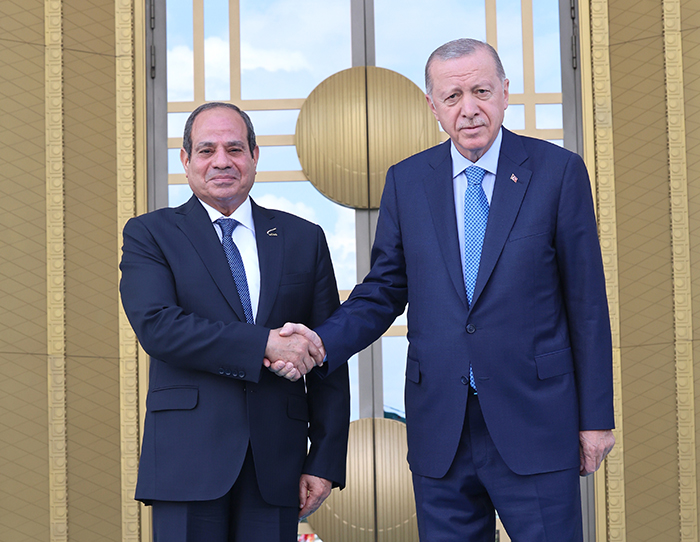Analyses / Middle East / North Africa
16 September 2024
Confirmation of the Reconciliation Between Turkey and Egypt.

For many reasons, the recent visit of Egyptian President Abdel Fattah al-Sisi to Turkey is of paramount importance, as after years of tension, it confirms the reconciliation between the two countries, which began in the spring of 2021. The development is significant, as we recall that Turkish President Recep Tayyip Erdoğan had frequently, often vehemently, criticized the coup orchestrated by the Egyptian army in the summer of 2013 to oust the legitimately elected Muslim Brotherhood, thus allowing Abdel Fattah al-Sisi to take power.
At the time, the Turkish president, strongly opposing his Egyptian counterpart, did not hesitate to label him a coup plotter, even stating that he would never recognize his power in Egypt and would refuse to participate in any meeting where he would be present. The rift was deep, and on most regional issues, the two leaders embodied antithetical political lines.
They were at odds, for example, when in 2017, several Gulf states and Egypt imposed an embargo on Qatar, which was supported by Turkey and Iran; when Turkey strengthened cordial relations with Ethiopia, which had disputes with Egypt over the sensitive issue of Nile water-sharing, considered existential by Cairo; when Egypt developed a full-fledged cooperation with Greece, Cyprus, Israel, and Jordan over the exploitation of hydrocarbons in the Eastern Mediterranean, intentionally excluding Turkey from these cooperation projects to isolate it; and when Egypt supported a faction in the Libyan conflict, a situation particularly tense because the two countries each supported opposing sides militarily.
These points of disagreement are now resolved, or on the way to being resolved. Despite a few brief moments of tension, the process of rapprochement and reconciliation that started a little over three years ago has been marked by Turkish President Erdoğan’s visit to Cairo in February 2024 and, more recently, by President al-Sisi’s visit to Turkey a few days ago. Meetings between ministers, intelligence officials, and senior officers have also punctuated these recent months.
This Turkish-Egyptian reconciliation clearly echoes a broader reconciliation process of Turkey with almost all Arab countries, with which it had numerous crises since the start of the Arab uprisings in 2011-2012. Thus, the restoration of relations has been particularly spectacular with Saudi Arabia and the United Arab Emirates. This reconciliation, however, is not devoid of ulterior motives for Ankara, given the significant need for investments from the Gulf Arab states to counterbalance the effects of the severe economic crisis that has been affecting the country for several years. Today, the only country in the region that remains resistant to Turkey’s efforts is Syria, where the demands of Bashar al-Assad are unacceptable to Turkey. Nonetheless, one can expect developments in this area soon.
It is within this context that the visit of Abdel Fattah al-Sisi led to the formalization of several agreements and future cooperation prospects.
First, on the economic front, the goal of doubling the trade exchange – from $7 billion to $15 billion – is significant, even though no specific deadlines have been set. Moreover, Egypt has now become the leading African investment destination for Turkish capital, representing an important gateway to the rest of the continent.
On the military front, there are prospects for the sale of Turkish drones, an area in which Turkey excels in military industry. This could lead to the training of Egyptian officers by their Turkish counterparts, a new aspect of bilateral relations. However, this issue is complicated by the relations Ankara has developed with Ethiopia in recent years, which could thus be compromised or at least reduced in intensity. This would contradict Turkey’s methodical expansion in the African continent, especially in its eastern part.
The most significant challenges remain in the Mediterranean, where the respective positions have not truly evolved due to the complexity of the issues. Two central issues, which are partly interlinked, remain: the first is hydrocarbons, and the second is Libya. Despite ongoing differences, it has been agreed that consultations will take place between the two countries regarding developments in the Libyan situation, which remains far from being stabilized.
Finally, the situation in Gaza was part of the discussions between the two presidents, confirming a convergence of views, even though the two countries are not in the same position on this issue. Egypt remains a key player in negotiations aimed at achieving a ceasefire and the release of Israeli and Palestinian hostages, whereas Turkey, through President Erdoğan’s radical condemnations, has removed itself from any possibility of influencing such negotiations.
These few elements confirm that the reconciliation process between the two countries now appears solidified, even though differences remain. Beyond the bilateral aspect, it is the reconfiguration of regional dynamics that is at work, in which Turkey wants to position itself as indispensable, an objective in which it has achieved significant successes in recent years. Thus, after the meeting between the two heads of state, the invitation of Turkish Minister Hakan Fidan to attend the Arab League’s Council of Foreign Ministers meeting for the first time after a 13-year absence is an indicator of the role Turkey is able to play in the region.
However, Ankara’s dream of establishing itself as the regional leader will remain unattainable as long as other regional powers have the same ambitions. This is particularly true of Saudi Arabia and Iran, with which Turkey currently maintains normalized relations, though not without competition, which is expected to intensify in the coming years. Egypt, for its part, weakened by its internal difficulties, is trying to regain its position in regional affairs, but it will take time before it can expect to restore the role it had acquired many years ago.

